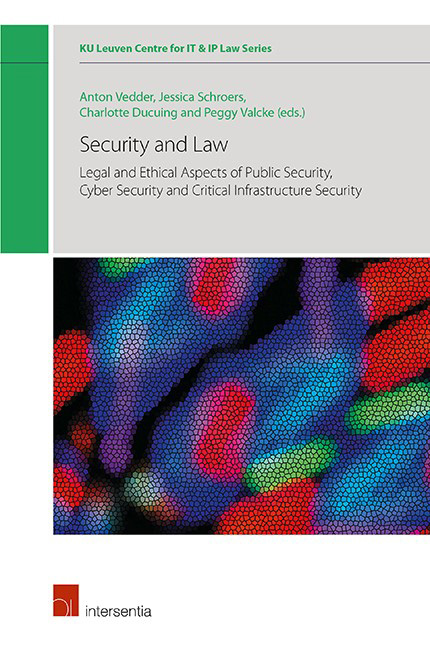 Security and Law
Security and Law Published online by Cambridge University Press: 23 January 2020
INTRODUCTION
According to Accenture, in 2019, each private company experienced, on average, 145 (cyber)security breaches, an increase of 11% in respect to 2017. The average cost of cybercrime for an organisation increased from 1.4 million to 13.0 million dollars. The economic impact of such attacks and their cross-border nature require collective action. Aware of the necessity to develop joint actions to address the technical and operational cybersecurity challenges, EU policymakers have started developing legislative initiatives with the intent of establishing a secure and trustworthy environment within the EU area. Nevertheless, the initial cybersecurity legislative initiatives developed at the EU level have not declared by the EU itself to be entirely coherent so far.
Considering this, this chapter is divided into two complementary sections to describe and assess the coherence of an EU cybersecurity framework. To do so, in the first part of this chapter, a comprehensive overview of the different interpretations that have been developed on the concept of coherence will be provided. Indeed, when it comes to defining what should be considered coherent action at the EU level, there is no clear, unique interpretation of such terminology. According to the context, policy or legally, the concept of coherence has been differently interpreted. Nevertheless, the latest legislative initiatives have demonstrated a positive change in this trend. Additionally, the key elements and actors that characterise the legislative development of EU cybersecurity initiatives are briefly described, namely, the EU cybersecurity agency ENISA and the role of public-private partnerships in the development of EU cybersecurity.
Subsequently, once having provided an overview of such crucial elements, the second part of the research aims to interpret the evolution of EU cybersecurity legislative initiatives. The chapter concludes by offering several normative reflections on the EU cybersecurity strategy that has been developed so far.
THE CONCEPT OF COHERENCE
Article 349, Treaty on the Functioning of the European Union (TFEU) states that the Council should adopt measures coherent with the Union legal order. Also considering these provisions and the way the European Union has been structured according to its Treaties, Gauttier has defined coherence as “the principle of action and organisation”, interpreting it from a policy-organisational perspective. In the EU, this concept can be found in primary law (Article 249 TFEU and 13 Treaty of the European Union-TEU), but regardless of the multiple references, it remains challenging to substantiate.
To save this book to your Kindle, first ensure no-reply@cambridge.org is added to your Approved Personal Document E-mail List under your Personal Document Settings on the Manage Your Content and Devices page of your Amazon account. Then enter the ‘name’ part of your Kindle email address below. Find out more about saving to your Kindle.
Note you can select to save to either the @free.kindle.com or @kindle.com variations. ‘@free.kindle.com’ emails are free but can only be saved to your device when it is connected to wi-fi. ‘@kindle.com’ emails can be delivered even when you are not connected to wi-fi, but note that service fees apply.
Find out more about the Kindle Personal Document Service.
To save content items to your account, please confirm that you agree to abide by our usage policies. If this is the first time you use this feature, you will be asked to authorise Cambridge Core to connect with your account. Find out more about saving content to Dropbox.
To save content items to your account, please confirm that you agree to abide by our usage policies. If this is the first time you use this feature, you will be asked to authorise Cambridge Core to connect with your account. Find out more about saving content to Google Drive.